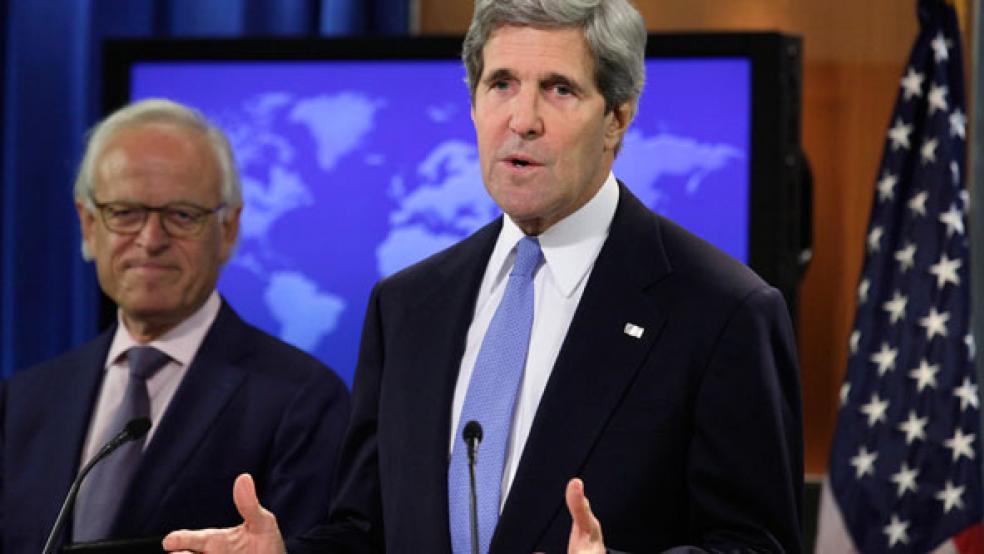Last night, for the first time in years, substantive talks between Israel and the Palestinians began in Washington.

The unexpected talks are preliminary, with both sides sitting down to create a framework for later negotiations. The talks are a welcome surprise since until recently, the White House showed little interest in a process that has failed repeatedly over the years.
“It’s been dormant because of a growing sense of despair that it’s an insolvable issue and that history would have to take its ugly course,” said Philip Wilcox, a former U.S ambassador in Jerusalem and president of the Foundation for Middle East Peace, a Washington-based foundation that advocates for peace between Israel and Palestine.
According to Wilcox, Israel – which is far more powerful than the Palestinians and has the upper hand in talks - is now agreeing to the talks because it is in danger of becoming a non-Jewish majority state. As a show of good faith, Israeli Prime Minister Benjamin Netanyahu agreed to release 104 Palestinian prisoners.
"This is an incomparably difficult decision, it is painful for the bereaved families and it is painful for the entire nation and it is also very painful for me," Netanyahu wrote of the decision in an open letter to the Israeli people.
Netanyahu’s gesture comes at a price. In return, Israel will demand recognition as a Jewish state, according to the Jerusalem post. Resumption of the peace talks has clearly been a pet project for Secretary of State John Kerry. He’s made multiple trips to the region since taking office in February, and has called a deal between Israel and the Palestinians the “granddaddy” of diplomacy.
The talks also come at a time of widespread uncertainty across the Middle East. Syria remains embroiled in a civil war while chaos continues in Egypt following the ouster of democratically elected President Mohamed Morsi. At the same time, Iranians recently elected moderate Hassan Rouhani, a rare Muslim politician that has urged better relations with the West. The White House has yet to formally engage with him.
The lack of action elsewhere in the Middle East makes the White House’s all-in on the peace talks a risky gamble. According to experts, it’s the last card the Obama administration has to play in the Middle East.
WANING INFLUENCE
According to Wilcox, the United States is making an attempt at Middle East peace because it has lost the ability to shape events elsewhere in the region. “Our influence is in steep decline [in the Middle East]. That’s a matter of history,” Wilcox said. “There’s growing understanding in this country that while we are a great power, there are severe limits to that.”
A recent survey of U.S. actions during several Middle East crises reveals these limitations.
• Calls from Washington to end violence in Libya were ignored. The Pentagon eventually gave air support to peacekeeping missions fronted by Europe.
• The U.S. offered only air support to French troops as they attempted to prevent Al Qaeda from toppling Mali in the Islamic Maghreb.
• The White House ignored its own conditions for intervention inthe Syrian civil war, refusing to act until well after our allies had determined the use of chemical weapons. The United States is now arming the rebels, although it’s unclear whether this strategy is effective.
• During his first term, Obama repeatedly expressed the desire to engage with former Iranian President Mahmood Ahmadinejad, despite his anti-Western rhetoric and the threats he made against Israel. After the moderate Rouhani was elected, Kerry issued a bland statement praising the election. Since then, there have been no public efforts to engage with him.
Combined, the lackluster U.S. response to these events show that Washington has lost its ability to shape the region.
“People in the region recognize that we’re not as dominant a power as we thought we were, that we were just as surprised by the Arab Spring as they were … and that we are, if anything, less capable of directing where things go from here than the indigenous peoples and governments,” Gordon Adams, a foreign-policy professor at American University, recently told the National Journal.
AN OLD FRIEND
According to Wilcox, the strong bond between Washington and Tel Aviv is imperative to showing the Middle East it can still shape event.
“There’s a chance to use American power and influence to bring the parties together, divide the land and create two states. That is not just a nice thing to do. It’s a matter of U.S. strategic interest," he said.
But will it work? Right now, negotiations are focused on who sits at the table and whether Coke or Pepsi will be served. Talks over substantive issues are months away.
At the very least, according to Wilcox, the talks represent Washington’s last-ditch attempt to influence events in a region. U.S. actions used to shape the balance of power in the Middle East. Now, Washington is simply trying to stay relevant.
"The United States has lost credibility in the Arab and Muslim word for its failure to use its strong relationship with Israel effectively," Wilcox said. "The Jewish founding fathers envisioned a Jewish and Democratic state – the United States doesn’t wish for that dream to go unfulfilled."





